双边投资协定
- 格式:pptx
- 大小:86.42 KB
- 文档页数:3

双边投资协定解读促进国际投资双边投资协定(Bilateral Investment Treaty,BIT)是两个国家之间签订的一项协议,旨在促进跨国投资、保护投资者利益、和解决投资争端。
通过双边投资协定的签署和实施,国际投资活动得以规范化和促进,有利于各国之间的合作与发展。
一、双边投资协定的背景和意义双边投资协定的签署和实施,是国际投资活动的重要保障与推动力。
在全球化与经济一体化的背景下,国际投资不断增长,各国之间的投资合作也日益密切。
双边投资协定的出现,旨在进一步加强投资便利化、降低投资风险、提升投资回报,为各国间的投资合作创造良好的环境。
二、双边投资协定的主要内容1.市场准入与优惠待遇:双边投资协定鼓励并确保各方投资的市场准入和公平待遇。
协定通常规定了投资者享有的权利和待遇,如国民待遇、最惠国待遇、非歧视待遇等。
2.投资保护机制:双边投资协定通过设立保护机制,确保投资者在对方国家的合法利益得到保护。
这些保护措施包括:合理和公正待遇、不得剥夺投资、免受歧视、合理和公正补偿等。
3.投资争端解决机制:双边投资协定通常设立投资争端解决机制,为投资者提供一种有效的解决投资争端的途径。
常见的解决机制包括国际仲裁和国际投资争端解决机构。
三、双边投资协定对国际投资的促进作用1.吸引外国直接投资:双边投资协定提供了投资保护和市场准入优惠,吸引了更多的外国直接投资。
投资者在享受双边投资协定所规定的待遇和保护的同时,也为双方国家带来了经济增长和就业机会。
2.促进投资营商环境的改善:双边投资协定要求各方提供公平、公正、透明的投资环境,推动了国内投资制度和法律的改革与完善,提高了国际投资的可预期性和稳定性。
3.解决投资争议与纠纷:双边投资协定设立的投资争端解决机制为投资者提供了在投资纠纷中寻求公正和公平解决的途径。
通过仲裁和调解等方式,保护了投资者的权益,提高了投资者对风险的承受能力。
四、双边投资协定面临的挑战和应对措施1.协定内容的保护和灵活性需求:随着国际投资形势和投资需求的变化,双边投资协定需要不断更新和调整。
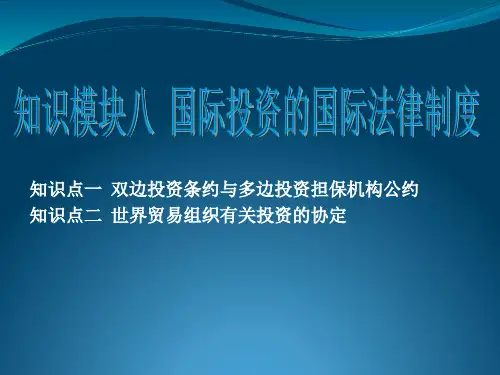
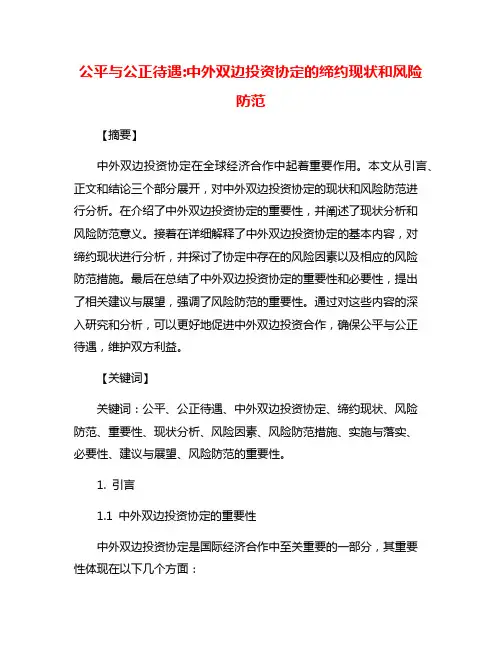
公平与公正待遇:中外双边投资协定的缔约现状和风险防范【摘要】中外双边投资协定在全球经济合作中起着重要作用。
本文从引言、正文和结论三个部分展开,对中外双边投资协定的现状和风险防范进行分析。
在介绍了中外双边投资协定的重要性,并阐述了现状分析和风险防范意义。
接着在详细解释了中外双边投资协定的基本内容,对缔约现状进行分析,并探讨了协定中存在的风险因素以及相应的风险防范措施。
最后在总结了中外双边投资协定的重要性和必要性,提出了相关建议与展望,强调了风险防范的重要性。
通过对这些内容的深入研究和分析,可以更好地促进中外双边投资合作,确保公平与公正待遇,维护双方利益。
【关键词】关键词:公平、公正待遇、中外双边投资协定、缔约现状、风险防范、重要性、现状分析、风险因素、风险防范措施、实施与落实、必要性、建议与展望、风险防范的重要性。
1. 引言1.1 中外双边投资协定的重要性中外双边投资协定是国际经济合作中至关重要的一部分,其重要性体现在以下几个方面:中外双边投资协定可以为投资者提供法律保障和预测性。
在国际投资活动中,投资者面临着各种风险,包括政治风险、市场风险、法律风险等。
签订双边投资协定可以明确双方的权利和义务,规范双方的行为,降低投资风险,提高投资者的信心。
中外双边投资协定可以促进经济发展和贸易合作。
通过双边投资协定,双方可以建立良好的投资环境,鼓励更多的投资流入,推动经济的发展。
投资者之间的合作也会带动贸易合作的深化,促进两国经济的互利共赢。
中外双边投资协定还可以促进技术转移和人才培养。
在国际投资合作中,投资者往往会带来先进的技术和管理经验,这有助于提升本国产业的技术水平和竞争力,推动产业升级和创新发展。
投资合作也会促进人才的交流和培养,提升本国劳动力的素质和竞争力。
中外双边投资协定的重要性不仅体现在保障投资者的合法权益和促进经济发展,更体现在推动国际合作和增进各国之间的互信与合作。
只有加强中外双边投资协定的签订和实施,才能更好地促进全球经济的繁荣和稳定。
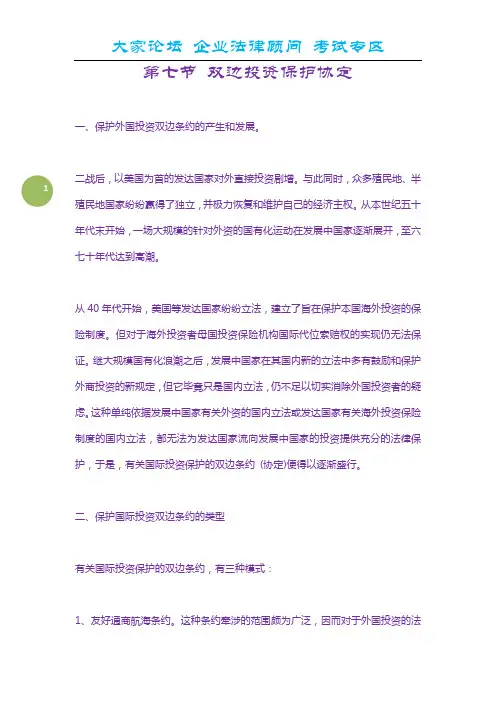
1第七节双边投资保护协定一、保护外国投资双边条约的产生和发展。
二战后,以美国为首的发达国家对外直接投资剧增。
与此同时,众多殖民地、半殖民地国家纷纷赢得了独立,并极力恢复和维护自己的经济主权。
从本世纪五十年代末开始,一场大规模的针对外资的国有化运动在发展中国家逐渐展开,至六七十年代达到高潮。
从40年代开始,美国等发达国家纷纷立法,建立了旨在保护本国海外投资的保险制度。
但对于海外投资者母国投资保险机构国际代位索赔权的实现仍无法保证。
继大规模国有化浪潮之后,发展中国家在其国内新的立法中多有鼓励和保护外商投资的新规定,但它毕竟只是国内立法,仍不足以切实消除外国投资者的疑虑。
这种单纯依据发展中国家有关外资的国内立法或发达国家有关海外投资保险制度的国内立法,都无法为发达国家流向发展中国家的投资提供充分的法律保护,于是,有关国际投资保护的双边条约(协定)便得以逐渐盛行。
二、保护国际投资双边条约的类型有关国际投资保护的双边条约,有三种模式:1、友好通商航海条约。
这种条约牵涉的范围颇为广泛,因而对于外国投资的法2律保护这一特定问题的规定往往欠明确、具体,美国等国家在1960年后就不再推行“友好通商航海条约"这一双边条约模式了。
2、投资保证协议。
此类双边协议的核心在于让对方缔约国正式确认美国国内的承保机构在有关的政治风险事故发生并依约向投保的海外投资者理赔之后,享有海外投资者向东道国政府索赔的代位权和其他相关权利及地位。
3、促进和保护投资协定。
此类协定内容详实具体,实体性规定和程序性规定并举,能够为资本输出国的海外投资提供切实有效的保护,因而一问世便得到各发达国家的竞相效仿和大力推行。
而且也为发展中国家所广泛接受。
三、双边投资保护协定的主要内容:当代各国所缔结的双边投资保护协定一般包含投资定义、批准、待遇、代位权、征收条件和补偿以及争端解决程序等条款,其内容往往是资本输出国和资本输入国利益平衡和互相妥协的结果。
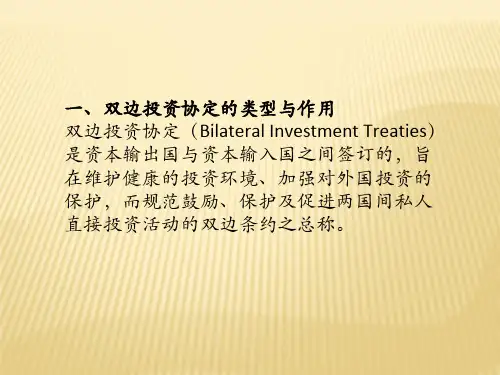

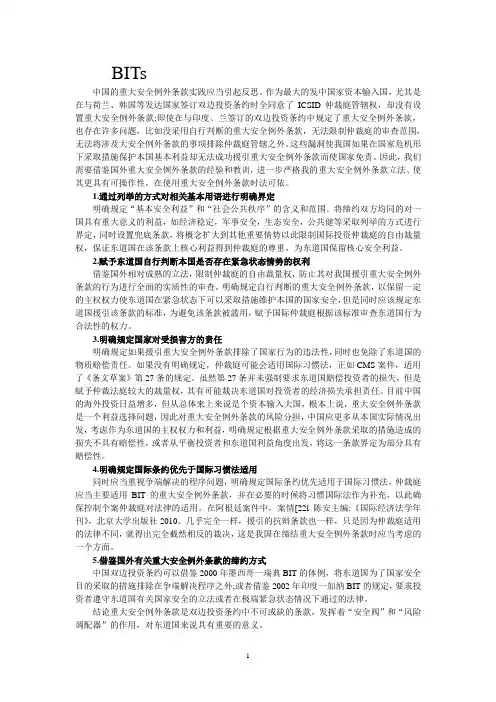
BITs中国的重大安全例外条款实践应当引起反思。
作为最大的发中国家资本输入国,尤其是在与荷兰、韩国等发达国家签订双边投资条约时全同意了ICSID仲裁庭管辖权,却没有设置重大安全例外条款;即使在与印度、兰签订的双边投资条约中规定了重大安全例外条款,也存在许多问题,比如没采用自行判断的重大安全例外条款,无法限制仲裁庭的审查范围,无法将涉及大安全例外条款的事项排除仲裁庭管辖之外。
这些漏洞使我国如果在国家危机形下采取措施保护本国基本利益却无法成功援引重大安全例外条款而使国家免责。
因此,我们需要借鉴国外重大安全例外条款的经验和教训,进一步严格我的重大安全例外条款立法、使其更具有可操作性,在使用重大安全例外条款时法可依。
1.通过列举的方式对相关基本用语进行明确界定明确规定“基本安全利益”和“社会公共秩序”的含义和范围。
将缔约双方均同的对一国具有重大意义的利益,如经济稳定,军事安全,生态安全,公共健等采取列举的方式进行界定,同时设置兜底条款,将概念扩大到其他重要情势以此限制国际投资仲裁庭的自由裁量权,保证东道国在该条款上核心利益得到仲裁庭的尊重,为东道国保留核心安全利益。
2.赋予东道国自行判断本国是否存在紧急状态情势的权利借鉴国外相对成熟的立法,限制仲裁庭的自由裁量权,防止其对我国援引重大安全例外条款的行为进行全面的实质性的审查。
明确规定自行判断的重大安全例外条款,以保留一定的主权权力使东道国在紧急状态下可以采取措施维护本国的国家安全,但是同时应该规定东道国援引该条款的标准,为避免该条款被滥用,赋予国际仲裁庭根据该标准审查东道国行为合法性的权力。
3.明确规定国家对受损害方的责任明确规定如果援引重大安全例外条款排除了国家行为的违法性,同时也免除了东道国的物质赔偿责任。
如果没有明确规定,仲裁庭可能会适用国际习惯法,正如CMS案件,适用了《条文草案》第27条的规定。
虽然第27条并未强制要求东道国赔偿投资者的损失,但是赋予仲裁法庭较大的裁量权,其有可能裁决东道国对投资者的经济损失承担责任。
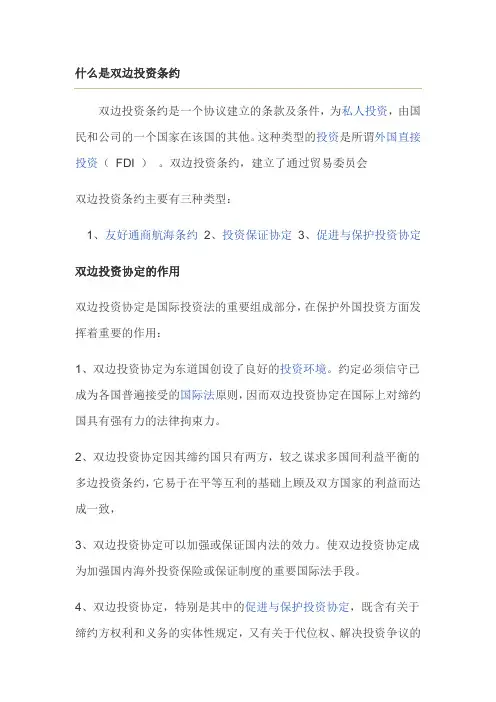
什么是双边投资条约双边投资条约是一个协议建立的条款及条件,为私人投资,由国民和公司的一个国家在该国的其他。
这种类型的投资是所谓外国直接投资(FDI )。
双边投资条约,建立了通过贸易委员会双边投资条约主要有三种类型:1、友好通商航海条约2、投资保证协定3、促进与保护投资协定双边投资协定的作用双边投资协定是国际投资法的重要组成部分,在保护外国投资方面发挥着重要的作用:1、双边投资协定为东道国创设了良好的投资环境。
约定必须信守已成为各国普遍接受的国际法原则,因而双边投资协定在国际上对缔约国具有强有力的法律拘束力。
2、双边投资协定因其缔约国只有两方,较之谋求多国间利益平衡的多边投资条约,它易于在平等互利的基础上顾及双方国家的利益而达成一致,3、双边投资协定可以加强或保证国内法的效力。
使双边投资协定成为加强国内海外投资保险或保证制度的重要国际法手段。
4、双边投资协定,特别是其中的促进与保护投资协定,既含有关于缔约方权利和义务的实体性规定,又有关于代位权、解决投资争议的程序性规定,为缔约国双方的私人海外投资者预先规定了建立投资关系所应遵循的法律规范结构和框架,可以避免或减少法律障碍,保证投资关系的稳定性,促进国际私人投资活动的发展。
5、双边投资协定不仅规定了缔约国之间因条约的解释、履行而产生争议的解决途径与程序,而且规定了外国投资者与东道国政府间因投资而产生争议的解决途径与程序,特别是大多数协定尚约定通过“解决投资争议国际中心”来解决这类争议,这就为投资争议的妥善解决提供了有力的保障。
双边投资协定的内容(一)受保护的投资者和投资1、投资者是指:(1)具有缔约国国籍或在缔约国境内有住所的自然人;(2)依缔约国法律设立、或在该缔约国内有住所的法人或非法人经济实体;(3)由缔约国公民或法人控制的第三国或对方缔约国的公司。
后者是采用资本控制原则所认定的与缔约国某一方有着重大联系的第三国或他方缔约国的法人或非法人经济实体。
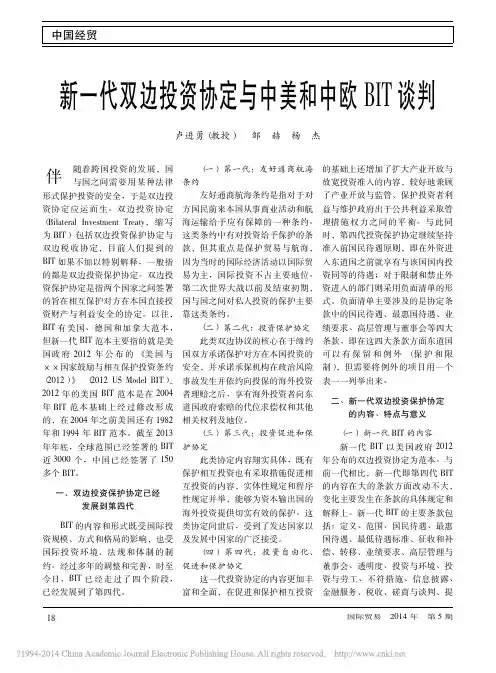
中国经贸新一代双边投资协定与中美和中欧BIT谈判卢进勇(教授)邹赫杨杰伴随着跨国投资的发展,国与国之间需要用某种法律形式保护投资的安全,于是双边投资协定应运而生。
双边投资协定(Bilateral Investment Treaty,缩写为BIT)包括双边投资保护协定与双边税收协定,目前人们提到的BIT如果不加以特别解释,一般指的都是双边投资保护协定。
双边投资保护协定是指两个国家之间签署的旨在相互保护对方在本国直接投资财产与利益安全的协定。
以往,BIT有美国、德国和加拿大范本,但新一代BIT范本主要指的就是美国政府2012年公布的《美国与ˑˑ国家鼓励与相互保护投资条约(2012)》(2012US Model BIT)。
2012年的美国BIT范本是在2004年BIT范本基础上经过修改形成的,在2004年之前美国还有1982年和1994年BIT范本。
截至2013年年底,全球范围已经签署的BIT 近3000个,中国已经签署了150多个BIT。
一、双边投资保护协定已经发展到第四代BIT的内容和形式既受国际投资规模、方式和格局的影响,也受国际投资环境、法规和体制的制约。
经过多年的调整和完善,时至今日,BIT已经走过了四个阶段,已经发展到了第四代。
(一)第一代:友好通商航海条约友好通商航海条约是指对于对方国民前来本国从事商业活动和航海运输给予应有保障的一种条约。
这类条约中有对投资给予保护的条款,但其重点是保护贸易与航海,因为当时的国际经济活动以国际贸易为主,国际投资不占主要地位。
第二次世界大战以前及结束初期,国与国之间对私人投资的保护主要靠这类条约。
(二)第二代:投资保护协定此类双边协议的核心在于缔约国双方承诺保护对方在本国投资的安全,并承诺承保机构在政治风险事故发生并依约向投保的海外投资者理赔之后,享有海外投资者向东道国政府索赔的代位求偿权和其他相关权利及地位。
(三)第三代:投资促进和保护协定此类协定内容翔实具体,既有保护相互投资也有采取措施促进相互投资的内容,实体性规定和程序性规定并举,能够为资本输出国的海外投资提供切实有效的保护。
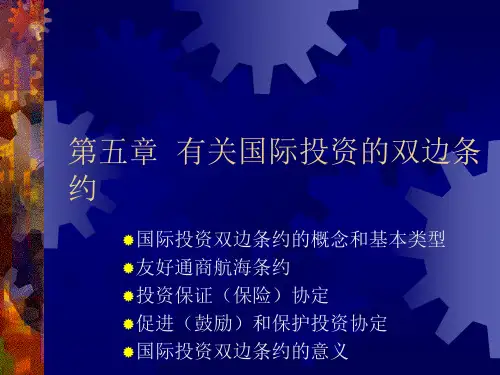

中华人民共和国政府和哥伦比亚共和国政府关于促进和保护投资的双边协定文章属性•【缔约国】哥伦比亚•【条约领域】投资•【公布日期】2008.11.22•【条约类别】协定•【签订地点】利马正文中华人民共和国政府和哥伦比亚共和国政府关于促进和保护投资的双边协定序言中华人民共和国政府和哥伦比亚共和国政府(以下称“缔约双方”),愿为缔约双方的共同利益加强经济合作,愿为缔约一方投资者在缔约另一方境内的投资创造和维持有利条件,认识到相互鼓励、促进和保护投资将有助于激励投资者的经营积极性和增进两国繁荣,达成协议如下:第一条定义本协定内:一、投资(一)“投资”一词系指缔约一方投资者依照缔约另一方的法律(注1)在缔约另一方领土内所投入的各种经济财产,特别是,包括但不限于:注1:在本协定中,“法律”一词系指缔约方各自的法律体系。
1.动产和不动产及其他财产权利如抵押、质押和类似权利;2.公司的股份、股票和对公司的其他各种经济参与;3.金钱请求权或者包括无担保债券在内的其他具有与投资相关的经济价值的履行请求权;4.知识产权,包括版权及相关权利和工业产权如专利、工艺流程、生产厂商的品牌和商标、商业名称、工业设计、专有技术和商誉;5.法律或行政法规授予的,或者根据法律可以通过合同授予的特许权,包括准许勘探、耕作、提炼和开发自然资源的特许权;6.根据缔约方法律设立的,期限在三年以上的所有与投资有关的外国贷款的交易。
投资不包括:1.公债交易;2.完全由以下原因引起的金钱请求权:(1)由缔约一方境内的公民或法人与缔约另一方境内的公民或法人缔结的货物和服务销售商事合同(2)与贸易交易相关联的贷款。
(二)作为投资或再投资的财产发生任何形式上的变化不影响其作为投资的性质,只要这种变化符合接受投资的缔约一方的法律。
(三)根据本条第一款,投资至少应具备如下性质:1.以资金或其他资源缴付出资;2.获得收益的预期;3.投资者对风险的负担。
二、投资者(一)“投资者”一词系指:1.依照缔约一方法律拥有该缔约方国籍的自然人;2.按照缔约一方法律在该缔约方领土内拥有住所及实质商业活动的法律实体,包括公司、社团、合伙和其他组织;3.非依缔约方法律设立但受本条第二款第(一)项第1目界定的自然人和第二款第(一)项第2目界定的法律实体实际控制的法律实体。
双边投资协定名词解释
嘿,你知道双边投资协定不?这玩意儿可重要啦!双边投资协定啊,就好比是两个国家之间为了保护彼此投资者的权益而签订的一份特殊“契约”。
比如说吧,就像你和你最好的朋友之间有个特别的约定,要
互相照顾、互相支持。
国家之间签订双边投资协定,就是为了给投资者们创造一个更稳定、更可靠的投资环境。
它规定了一系列的规则和保障措施呢!比如,在
对方国家投资遇到问题了,能依据这个协定来寻求保护和解决办法。
这就好像你去一个陌生的地方冒险,手里有了一张可靠的地图,心里
就踏实多了呀!
想象一下,如果没有双边投资协定,那投资者得多心慌啊!就好比
你要去爬山,却没有任何安全装备,那多吓人啊!有了双边投资协定,投资者们就像有了一把保护伞,能更放心大胆地去开拓新的领域,去
创造财富。
而且哦,双边投资协定还能促进两国之间的经济合作和交流呢!它
能让双方的企业更容易进入对方市场,开展业务。
这不就像是给两国
之间搭建了一座坚固的桥梁,让人员、资金、技术等各种资源能够更
顺畅地流动起来吗?
那它具体都有哪些内容呢?这可多了去了!像投资的定义、待遇标准、争端解决机制等等。
这些内容都是为了确保投资者的权益得到充分保护,同时也促进两国经济的共同发展。
你说,双边投资协定是不是很厉害?它对于国家和投资者来说,真的是太重要啦!它就像是黑暗中的一盏明灯,照亮了投资者前行的道路,也为两国的经济合作注入了强大的动力。
所以啊,我们一定要好好了解它,利用它,让它为我们的发展带来更多的好处!。
问答一:双边投资协定的类型及其含义双边投资协定的类型:•友好通商航海条约•投资保证协定•促进和保护投资协定(一)友好通商航海条约•“友好通商航海条约”的主要内容是为了确立缔约国之间的友好关系,双方对于对方国民前来本国从事商业活动给予一定的保障,赋予海上航行自由等,它不是专门的保护国际投资的协定,因此其中关于国际投资保护的内容较少,而且常常规定含糊。
(二)投资保证协定•鉴于友好通商航海条约的缺陷,同时和为了和本国的海外投资保险制度相配套,从20世纪50年代起,美国开始大力推行双边投资保证协定。
•这种双边协定的核心在于让对方缔约国确认美国的承保机构在有关政治风险事故发生并依约向投保的海外投资者理赔后,享有海外投资者向东道国政府索赔的代位权和其他相关权利和地位。
(三)促进和保护投资协定•从20世纪60年代起,德国以及其他一些欧洲国家将原来的友好通商航海条约中有关保护外国投资的内容与美国的投资保证协定相融合并加以具体化,从而制定出“促进和保护投资协定”这种新的形式。
•这种协定内容具体翔实,实体性规范和程序性规范并举,能够为资本输出国的海外投资提供切实有效的保护,得到世界上很多国家的效仿。
双边投资保护协定的主要内容:•双边投资保护协定的内容是投资国和东道国双方谈判和妥协的结果,因此,由于不同国家的具体经济情况不同,它们之间签订的协定的内容也会大相径庭。
问答二:征收的有关内容征收的概念:•征收是指国家基于公共利益的需要将外国投资者的财产收归国有的行为。
征收可分为两种类型:•一种是“直接征收”,指东道国政府公开地、一次性地对外资实行征用的行为;•另一种是“间接征收”,指东道国政府采取干预外国投资者行使财产权的各种措施,迫使他们放弃自己投资的行为,又称“事实征收”、“变相征收”、“推定征收”、“逐渐征收”以及“管理征收”等。
征收的条件:从有关外资法律与实践来看,征收应满足以下条件:•公共利益的需要•非歧视•符合法定程序征收的补偿:(1)征收补偿的标准•“充分、及时、有效”的补偿;•“适当”补偿。
双边投资协定条约,BIT(Benin-China)The Government of the People's Republic of China and the Government of the Republic of BeninThe Government of the People's Republic of China and the Government of the Republic of Benin (hereinafter referred to as the Contracting Parties), Desiring to create favorable conditions for investment by investors of one Contracting Party in the territory of the other Contracting Party; Recognizing that the reciprocal encouragement, promotion and protection of such investment on the basis of equality and mutual benefits will be conducive to stimulating business initiative of the investors and will increase prosperity in both States; Convinced that the promotion and protection of these investments would succeed in stimulating transfers of capital and technology between the two States in the interest of their economic development; Aware that each Contracting Party is entitled to stipulate the laws on the establishment and administration of the investment in its territory; Have agreed as follows:Article 1 DEFINITIONS For the purpose of this Agreement,1,The term "investment" means every kind of asset invested by investors of one Contracting Party in accordance with the laws and regulations of the other Contracting Party in the territory of the latter, and in particularly, though not exclusively, includes:(a) movable and immovable property and other property right such as mortgages, pledges, liens, usufructs and similar rights;(b) shares, debentures, stock and any other kind of participation in companies;(c) claims to money or to any other performance having an economic value associated with an investment;(d) intellectual and industrial property rights, in particular, copyrights, patents, trade-marks, trade-names, technical process, know-how and good-will;(e)business concessions conferred by law or under contract permitted by law, including concessions to search for, cultivate, extract or exploit natural resources. Any change in the form in which assets are invested does not affect their character as investments provided that such change is in accordance with the laws and regulations of the Contracting Party in whose territory the investment has been made.2, The term "investor" means,(a) natural person who, in accordance with the laws of the people's Republic of China or of the Republic of Benin, has nationality of the People's Republic of China or of the Republic of Benin respectively;(b)legal entity, including company, association, partnership and other organizations, incorporated or constituted under the laws and regulations of the People's Republic of China or of the Republic of Benin and having its registered office in the territory of the People's Republic of China and the Republic of Benin respectively.3, The term "return" means the amounts yielded from investments, including profits, dividends, interests, capital gains, royalties, fees and other legitimate income.4, The term "territory" means the territory of each Contracting Party as well as the maritime zones adjacent to the external demarcation of the territorial sea, in which each of Contracting Parties, in accordance with international law, exercise sovereign rights and/or jurisdiction.Article 2 PROMOTION AND PROTECTION OF INVESTMENT1,Each Contracting Party shall endeavor to promote investments made by investors of the other Contracting Party in its territory and, shall admit and protect such investments in accordance with its laws and regulations.2, Investments of the investors of either Contracting Party shall enjoy the full and complete protection and safety in the territory of the other Contracting Party.3,Investments of investors of each Contracting Party shall all the time be accorded fair and equitable treatment in the territory of the other Contracting Party.4, Without prejudice to its laws and regulations, neither Contracting party shall take any unreasonable or discriminatory measures against the management, maintenance, use, enjoyment and disposal of the investments by the investors of the other Contracting Party.5,Subject to its laws and regulations, one Contracting Party shall provide assistance and facilities for obtaining visas andworking permit to nationals of the other Contracting Party engaging in activities associated with investments made in the territory of that Contracting Party.Article 3 NATIONAL TREATMENT AND MOST-FAVORED-NATION TREATMENT1,Without prejudice to its laws and regulations, each Contracting Party shall accord to investments and activities associated with such investments by the investors of the other Contracting Party treatment not less favorable than that accorded to the investments and associated activities by its own investors.2, Neither Contracting Party shall subject investments and activities associated with such investments by the investors of the other Contracting Party to treatment less favorable than that accorded to the investments and associated activities by the investors of any third State.3, The provisions of Paragraph 2 of this Article shall not be construed so as to oblige one Contracting Party to extend to the investors of the other Contracting Party the benefit of any treatment, preference or privilege by virtue of :(a) any customs union, free trade zone, economic union and any international agreement resulting in such unions, or similar institutions;(b) any international agreement or arrangement relating to taxation;(c) any arrangements for facilitating small scale frontier trade in border areas.Article 4 EXPROPRIATION1,Neither Contracting Party shall expropriate, nationalize or take other similar measures (hereinafter referred to as "expropriation") against the investments of the investors of the other Contracting Party in its territory, unless the following conditions are met:(a) for the public interests;(b) under domestic legal procedure;(c) without discrimination;(d) against compensation.2,The compensation mentioned in Paragraph 1 of this Article shall be equivalent to the value of the expropriated investments immediately before the expropriation is taken or the impending expropriation becomes public knowledge, whichever is earlier. The value shall be determined in accordance with generally recognized principles of valuation. The compensation shall include interest at a normal commercial rate from the date of expropriation until the date of payment. The compensation shall also be made without delay, be effectively realizable and freely transferable.Article 5 COMPENSATION FOR DAMAGES AND LOSSES Investors of one Contracting Party whose investments in the territory of the other Contracting Party suffer losses owing to war or other armed conflicts a state of national emergency, insurrection, riot, revolt or other similar events occurring in the territory of the latter Contracting Party, shall be accorded by the said Contracting Party treatment, as regards restitution, indemnification, compensation and other settlements no less favorable than that accorded to the investors of its own or any third State, whichever is more favorable to the investor concerned.Article 6 TRANSFERS1, Each Contracting Party shall, subject to its laws and regulations, guarantee to the investors of the other Contracting Party the transfer of their investments and returns held in its territory, including:(a) profits, dividends, interests and other legitimate income;(b) proceeds obtained from the total or partial sale or liquidation of investments;(c) payments pursuant to a loan agreement in connection with investments;(d) royalties or fees in relation to intellectual and industrial property rights referred to in Paragraph 1(d) of Article 1;(e) payments of technical assistance or technical service fee, management fee;(f) payments in connection with contracting projects;(g) earnings of nationals of the other Contracting Party who work in connection with an investment in its territory.2, Nothing in Paragraph 1 of this Article shall affect the free transfer of compensation paid under Article 4 and 5 of this Agreement.3, The transfer mentioned above shall be made in a freely convertible currency and at the prevailing market rate of exchange applicable within the Contracting Party accepting the investments and on the date of transfer.4, In the absence of a market for foreign exchange, the rate to be used shall be the most recent exchange rate for the conversions of currencies into Special Drawing Rights.Article 7SUBROGATION If one Contracting Party or its designated agency makes a payment to its investors under a guarantee or a contract of insurance against non-commercial risks it has accorded in respect of an investment made in the territory of the other Contracting Party, the latter Contracting Party shall recognize:(a) the assignment, whether under the law or pursuant to a legal transaction in the former Contracting Party, of any rights or claims by the investors to the former Contracting Party or to its designated agency, as well as,(b) that the former Contracting Party or its designated agency is entitled by virtue of subrogation to exercise the rights and enforce the claims of that investor and assume the obligations related to the investment to the same extent as the investor.Article 8 SETTLEMENT OF DISPUTES BETWEEN CONTRACTING PARTIES1,Any dispute between the Contracting Parties concerning the interpretation or application of this Agreement shall, as far as possible, be settled with consultation through diplomatic channel.2,If such a dispute cannot thus be settled within six (6) months subsequent to the beginning of the consultation, it shall, upon the request of either Contracting Party, be submitted to an ad hoc arbitral tribunal.3, Such tribunal comprises of three arbitrators. Within three (3) months of the receipt of the written notice requesting arbitration, each Contracting Party shall appoint one arbitrator. Those two arbitrators shall, within further two (2) months, together select a national of a third State having diplomatic relations with both Contracting Parties as Chairman of the arbitral tribunal.4,If the arbitral tribunal has not been constituted within five (5) months from the receipt of the written notice requesting arbitration, either Contracting Party may, in the absence of any other agreement, invite the President of the International Court of Justice to make any necessary appointments. If the president is a national of either Contracting Party or is otherwise prevented from discharging the said functions, the Member of the International Court of Justice next in seniority who is not a national of either Contracting Party or is not otherwise prevented from discharging the said functions shall be invited to make such necessary appointments.5, The arbitral tribunal shall determine its own procedure and shall reach its award in accordance with the provisions of this Agreement and the principles of international law accepted by both Contracting Parties.6, The arbitral tribunal shall reach its award by a majority of votes. Such award shall be final and binding upon both Contracting Parties. The arbitral tribunal shall, upon the request of either Contracting Party, explain the reasons of its award.7, Each Contracting Party shall bear the costs of its appointed arbitrator and of its representation in arbitral proceedings. The relevant costs of the Chairman as well as any other cost of the tribunal shall be borne in equal parts by the Contracting Parties.Article 9 SETTLEMENT OF DISPUTES BETWEEN INVESTORS AND ONE CONTRCTING PARTY1, Any dispute between an investor of one Contracting Party and the other Contracting Party in connection with an investment in the territory of the other Contracting Party shall, as far as possible, be settled amicably through consultations between the parties to the dispute.2,If the dispute cannot be settled through consultations within six (6) months from the date it has been raised by either party to the dispute, it shall be submitted by the choice of the investor, either to the competent court of the State where the investment was made, or to international arbitration.3, In case of international arbitration, the dispute shall be submitted, at the option of the investor, to: (a) International Center for Settlement of Investment Disputes (ICSID) under the Convention on the Settlement of Disputes between States and Nationals of Other States, done at Washington on March 18, 1965; or (b) An ad hoc arbitral tribunal established under the Arbitration Rules of the United Nations Commission on International Trade Law (UNCITRAL); Provided that the Contracting Party involved in the dispute may require the investor concerned to go through the domestic administrative reviewprocedures specified by the laws and regulations of that Contracting Party before the submission to international arbitration.4, Once the investor has submitted the dispute to the competent court of the State where the investment was made, to the ICSID, or to the ad hoc arbitral tribunal referred to in Paragraph 2 and 3 of this Article, the choice of one of the three procedures shall be final.5, The arbitral tribunal shall make arbitral award based on:(a) provisions of this Agreement;(b) laws of the State where the investment was made including its rules on the conflict of laws;(c) the principles of international law accepted by both Contracting Parties;(d) specific bilateral agreements on investment between the Contracting Parties;(e) other international treaties on investment to which both Contracting Parties are or may become parties.6, The arbitral award shall be final and binding upon both parties to the dispute. Both Contracting Parties shall commit themselves to the enforcement of the award.Article 10 OTHER OBLIGATIONS1, If the legislation of either Contracting Party or international obligations existing at present or established hereafter between the Contracting Parties result in a position entitling investments by investors of the other Contracting Party to a treatment more favorable than is provided for by the Agreement, such position shall not be affected by this Agreement.2, Each Contracting Party shall observe any commitments it may have entered into with the investors of the other Contracting Party as regards to their investments.Article 11 APPLICATION This Agreement shall apply to investment made prior to or after its entry into force by investors of one Contracting Party in the territory of the other Contracting Party in accordance with the laws and regulations of the Contracting Party concerned, but not apply to the dispute arose before its entry into force.Article 12 CONSULTATIONS1, The representatives of the Contracting Parties could hold meetings from time to time for the purpose of:(a) reviewing the implementation of this Agreement;(b) exchanging information and investment opportunities;(c) resolving disputes arising out of investments;(d) forwarding proposals on promotion of investment;(e) studying other issues in connection with investment.2, Where either Contracting Party requests consultation on any matter of Paragraph 1 of this Article, theother Contracting Party shall give prompt response through diplomatic channel and the consultation be held alternatively in Beijing and Cotonou.Article 13 ENTRY INTO FORCE, DURATION AND TERMINATION1,This Agreement shall enter into force on the thirtieth (30) day following the date on which both Contracting Parties have notified each other in writing that their respective internal legal procedures necessary therefor have been fulfilled.2, This Agreement shall remain in force for a period of ten (10) years and shall thereafter remain in forcefor the same term until either Contracting Party notifies the other in writing to terminate it six (6) monthsbefore the expiration of such a period.3, With respect to investments made prior to the date of termination of this Agreement, the provisions ofthis Agreement shall continue to be effective for a further period of ten (10) years from such date of termination.Article 14AMENDMENT This Agreement may be amended by written agreement between the Contracting Parties. Anyamendment shall enter into force under the same procedures required for entryinto force of this Agreement. IN WITNESS WHEREOF the undersigned, duly authorized thereto by respective Governments, have signed this Agreement. Done in duplicate in Beijing on February 18,2004, inthe Chinese, French and English languages, all texts being equally authentic. For the Government ofFor the Government ofThe People's Republic of China The Republic of Benin。